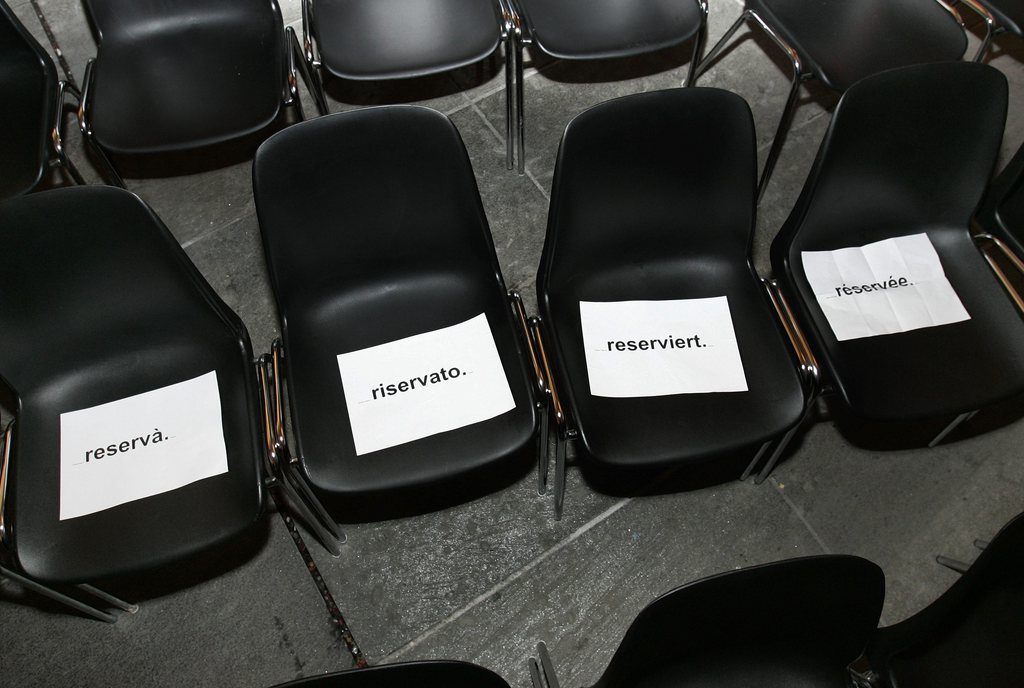Holding the line on Latin

The trend to drop Latin as a requirement for university means declining demand in Swiss schools. Latin teachers are trying new ways to “sell” the traditional subject to pupils and parents.
There has been heated argument in Switzerland lately about the position of Latin in the educational system. As in other European countries, it was traditionally a part of at least the academic stream of secondary education.
Now it seems to be on the wane. Yet there was an uproar in Geneva last year over a proposal by the cantonal government to drop Latin from the general curriculum. A campaign led by classics teachers got it reversed (see sidebar).
Nevertheless, Swiss universities, which used to require Latin as a prerequisite for undergraduate students, are scaling it back. It is no longer required for medicine or law. As of this semester, Basel University no longer requires Latin as a prerequisite to study history either.
On the other hand, the Arts Faculty at Zurich University, faced with a similar decision, has opted to keep the Latin requirement. It has been pointed out, however, that the many students who now come without Latin have to take a crash-course in the language at the university to qualify for their subjects. Whether there is much left of classical ideals in this hothouse atmosphere is a moot point.
The controversies in Basel and in Zurich have, as in Geneva, raised the ire of traditionalists protesting against the abandonment of the Western cultural heritage. These arguments do not carry as much weight as they used to and have been answered in the Swiss media by hardened Latin sceptics.
Encountering strangeness
To reinforce their case, some Latin teachers in the secondary school system have been trying to make the subject more relevant to present-day concerns. In a brochure they have issued they emphasise the very remoteness of Latin and say it can play a role in developing intercultural competence and even in integrating immigrants.
Gabriela Trutmann is president of a classical teachers’ forum in Zurich. “In Latin class the students are constantly confronted with what is foreign and sometimes even alienating,” she says.
“Yet this ‘foreign’ element is close to them, because it has decisively shaped our Western culture and worldview. So they gain a different understanding of our culture and foreign cultures.”
Andreas Külling, who heads a group of Latin teachers in Basel and neighbouring cantons, agrees.
“We think of the Latin vocabulary and the contents of Latin texts as an encounter with a strange world from the past; when we take a second look, however, there is much that is very close to us and helps us to understand our own world better.”
Multilingual approach
More practically, perhaps, the teachers also have proposals to use the language as a bridge to help youngsters learn modern languages, by acquiring a general framework for language learning.
“Basic grammatical structures can be demonstrated in an exemplary way using Latin,” says Külling. “Combinations of Latin with a modern foreign language have been tried successfully, but they were isolated cases. Now we are doing this more intensively with multilingual didactics.“
Multilingual didactics, he explains, focuses on the common points of languages so that they only need to be learned once, thus allowing the learning of several languages to proceed more quickly and efficiently. This approach has particular relevance for Switzerland, traditionally a multilingual country where knowing two or three languages is routine.
For German-speakers in particular, learning Latin can provide a useful framework for the learning of Romance languages – French, Italian and Romansh, in the case of Switzerland – and English.
“Light-bulb” moments
“In teaching Latin at the lower level (the first two years of secondary school) we look at language intensively and in a general way,” says Trutmann. “How does language work? What problems do I have to solve when I construct a sentence? What are the components of sentences? What things can I express with what sentence structures? How are tenses used?”
So the Latin class becomes a place of comparative language study.
“This is really interesting because we are now getting a lot of kids who do not speak German as their native language, but French, Italian or English.”
Latin gives them a means of comparing their second and their native language. “As a result, you often see a light suddenly going on in their heads in relation to their own language and German – and Latin too.”
Trutmann finds that teachers of modern languages are happy “to leave reflection on language to Latin so they can focus more on oral communication in the foreign language”.
She comes back to the point that Latin teaches students to think analytically, and quotes a Zurich study showing that Latin marks correlate best with marks in all other subjects. In other words, the better the marks in Latin a pupil has, the better they are in other subjects.
“The reason may lie in the non-specific skills which Latin teaching is probably best able to transmit,” she believes.
Even so, in Switzerland and elsewhere, defending Latin remains an uphill battle for those who advocate its continued use. It is declining even in its last bastion, the Roman Catholic Church.
The Second Vatican Council, which took place fifty years ago this October, was conducted largely in Latin. It was probably the last such occasion in history. In fact, Pope Benedict XVI has just decided to set up a Pontifical Academy of Latin for the first time. Previously, there was no need for one.
Latin has always had a special place in Switzerland. The abbreviation for the country, which mystifies many a foreigner, is CH, standing for “Confoederatio Helvetica” or Swiss Confederation.
With four national languages, Latin represents neutral ground. This is reflected in the names of several national organisations, such as “Pro Juventute” for children and youth, “Pro Senectute” for old people.
The Swiss medical association is abbreviated to FMH, which stands for “Foederatio Medicorum Helveticorum”. Today English is being used for the same purpose, hence the proliferation of names like “Swissmedic”.
Throughout Europe, Latin was used by philosophers and scientists from Newton to Linnaeus to reach an international audience. There have been many able Swiss writers in Latin, from the Geneva reformer Calvin and the Zurich humanist Gesner in the 16th century to the great Bern all-round scientist Albrecht von Haller in the 18th.
Despite this tradition, Latin teaching in Switzerland has sharply declined in recent years. According to the Federal Statistics Office, about 18,000 students graduated from academic secondary schools in 2011. Only about 1,000 of these took Latin and/or Greek as their major subject. In 1999 the figure was about 4,000.
Last spring, in the city once run by Jean Calvin, author of the “Institutio Christianae Religionis”, one of the major theological works of the Reformation, the government was preparing to quietly drop Latin from the curriculum offered at the beginning of secondary school.
Latin teacher Patricia Arpin and colleagues banded together and started a petition against this. They surprised even themselves by gathering no less than 17,000 signatures in the space of two and a half months. The government backed down.
Liberal member of the Geneva parliament Pierre Weiss, a supporter of the petition, exulted: “We are not just defending a subject, but the roots of our culture, the virtues of rigorous reasoning in a society that seems to be drifting. Lingua latina salva est!” [Latin is safe!]

In compliance with the JTI standards
More: SWI swissinfo.ch certified by the Journalism Trust Initiative




You can find an overview of ongoing debates with our journalists here . Please join us!
If you want to start a conversation about a topic raised in this article or want to report factual errors, email us at english@swissinfo.ch.